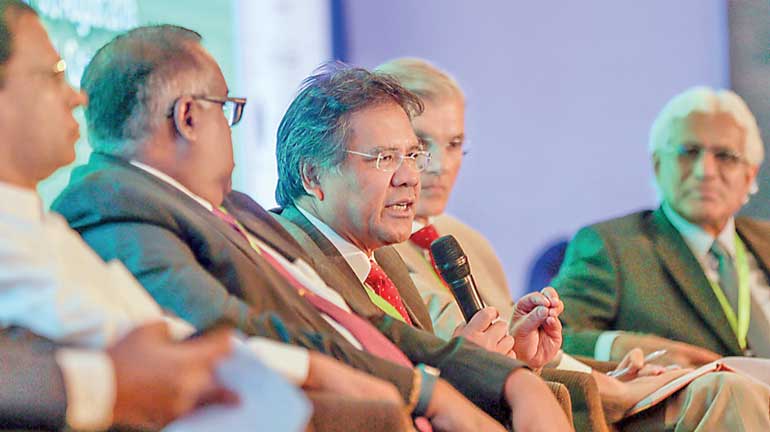Wednesday Feb 18, 2026
Wednesday Feb 18, 2026
Wednesday, 3 August 2016 00:00 - - {{hitsCtrl.values.hits}}
 Malaysian official Idris Jala (third from left) stresses a point during the inauguration of the Sri Lanka Economic Summit yesterday. President Maithripala Sirisena is also present
Malaysian official Idris Jala (third from left) stresses a point during the inauguration of the Sri Lanka Economic Summit yesterday. President Maithripala Sirisena is also present
By Uditha Jayasinghe
Top public policy makers and private sector representatives should be locked up together for eight weeks to hammer out investment plans to their finest details to boost confidence on both sides and lock in investment deals, a top Malaysian bureaucrat advised yesterday as the solution to Sri Lanka’s public-private trust gap.
Performance Management and Delivery Unit (PERMANDU) Malaysia Chief Executive Officer (CEO) Dato Sri Idris Jala speaking at the opening session of the Sri Lanka Economic Summit organised by the Ceylon Chamber of Commerce gave the Malaysian example of “labs” where public servants and companies sit down for eight weeks to plan out every single component of an investment project, which will then be transparently implemented.
“Malaysia faced much the same situation in 2009 that Sri Lanka faces now. We had high Budget deficit with debt of 53.5% of GDP and we knew that if we wanted to change this situation we had to act. Malaysia did a revolutionary thing to get the Government to focus on a few sectors and got the large players of the private sector and for eight weeks they planned the investment in precise details. In 2010 Malaysia locked together 500 people at the end of the planning session the private sector committed 400 billion Ringgit in investment,” he said.
The much lauded and intense planning session has been analysed as a case study by Harvard, Princeton and the World Bank for its ability to breakdown overarching and often disconnected Government policy to tangible private sector projects that have successfully infused billions of dollars of investment into the Malaysian economy in the past six years and helped the country break the middle-income trap. Drawing from his experience the CEO insisted that the Government did not make fresh appointments to the public sector but simplified the implementation process extensively so it could be understood and followed by any public employee.
“The projects were specific commitments and in the past six years these projects were implemented. Government revenue increased at record levels each year and Budget deficit shrank to 3.2% in 2015 and we passed laws in parliament to ensure that debt could not exceed 55% of GDP because policy makers felt that the Europe model was unsustainable.”
The official was adamant that the lab system is the most effective way to release private sector investors and highly recommended his Sri Lankan counterparts follow it.
“Policy making cannot be done at 33,000 feet it has to be done at 300 feet. It has to be direct and there has to be sync between the Government plan and private sector targets. We all know 90% of problem of any government is implementation. I think the time has come for Sri Lanka to just stop talking and release private sector investment.”
Addressing Finance Minister Ravi Karunanayake the Malaysian official called on him to, “find a way to get the private sector into a room for eight weeks and run the labs and bring the recommendations that anybody can view. The existing people in Government can do more provided the plan is brought down. If it is very detailed then even a monkey can do it.”